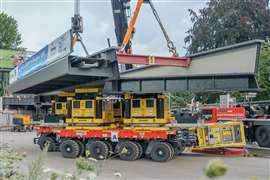Read this article in French German Italian Portuguese Spanish
Breaking down the latest trends in the articulating crane market
05 August 2024
Over the past decade, articulating cranes, also known as knuckle boom cranes, have been gaining in popularity as users begin to understand their attributes.
“One of the biggest drivers is the growing awareness of the benefits of knuckle boom cranes we are seeing from traditional North American telescopic or stiff boom crane users,” said Greg Sneek, product manager, articulating cranes, Palfinger North America. “These operators see the benefits of higher payloads, greater reach, the ability to work in confined spaces and the efficiency of quick set-up times.”
 The new PM 70.5 has the Smart Winch system that is designed to keep the boom from two-blocking and allows the operator to focus on winching and elevating.
The new PM 70.5 has the Smart Winch system that is designed to keep the boom from two-blocking and allows the operator to focus on winching and elevating.
Sneek said Palfinger has seen pent up demand in several industries like building materials, tree removal and general infrastructure maintenance.
Enhancing productivity is the key to these machines, according to Scott Whitaker, sales director, Manitex PM.
“The ability to precisely place materials through windows or on roofs, spot place material or equipment on the ground, and the ability to place loads under overhead obstructions makes them increasingly popular,” Whitaker said. “Being able to have the crane on the delivery truck makes the truck extremely useful also. Radio remote control operation means the operator can be at the delivery point operating the crane and takes away having to have multiple people at deliveries.”
Whitaker said the North American articulating crane market has been growing steadily over the past 10 years. Sneek agreed, but said the market has recently shown a few signs of instability.
“This is primarily due to chassis availability and installation capacity constraints in segments of the sales channel,” Sneek said. “Increases in interest rates and inflation [are other factors]. History tells us an election year in the U.S. often brings delayed consumer spending. Between this hesitancy and residual supply chain issues, we predict pent up demand from the last few years moving into late 2024.”
Demand for this class of crane has grown due to users discovering the nuances of what they can and can’t do with articulating cranes. Whitaker said the key is knowing the correct size for the application.
“The way I would size a crane for someone would be what is the maximum weight you would like to pick up and how far out do you need to set it down?” he explained. “For instance, a precast company makes a 25,000-pound septic tank and wants to place it 20 feet away. I pick the crane that will do that and then size the truck accordingly. A monument company that sets headstones wants to place 4,000-pound markers at 15 feet and stay on a Ram 5500 chassis.
“I have seen crane sizes increase every year because nothing is getting lighter and everybody wants to reach further,” Whitaker continued. “Another attribute would be the ability to fold out the way of the body for full loading of the body. They are designed to lift a heavy load and rotate the load and set it down for a minimum of 200,000 load cycles without any structural breaks. Through [sophisticated electronics systems], articulating cranes have the ability to fold themselves up with the touch of a button.”
The capacities with the highest interest are in the 50,000 to 330,000 foot-pound (20 to 45-meter ton) range, Sneek said.
“Palfinger offers a wide scope of knuckle boom cranes that meet user application requirements from 10,000 up to more than 1-million-foot pounds.”
Palfinger TEC series
Palfinger’s TEC series is the latest generation of its premium technology knuckle boom cranes. With wide outreach, maximum lifting power and innovative features, the TEC series offers a range of comfort functions and intelligent assistance systems to support operators with precision lifting tasks, Sneek said.
 The patented tear-drop P-Profile boom makes the boom extension system of Palfinger’s TEC range rigid and lightweight for more load stability and better mileage.
The patented tear-drop P-Profile boom makes the boom extension system of Palfinger’s TEC range rigid and lightweight for more load stability and better mileage.
The patented tear-drop P-Profile boom makes the boom extension system rigid and lightweight for more load stability and better mileage, Sneek said. The P-Fold assistance system and Leveling Assistant let the operator unfold and stabilize quickly with HPSC as well as Memory Position, which stores and recalls up to four crane positions through the PALcom P7 remote control.
“Palfinger has simplified operation with one-lever Crane Tip Control, the intelligent system Rope Tension Control, and Synchronized Rope Control for consistent performance,” Sneek said.
PM Group 65 series
Last spring, Manitex PM started the first deliveries of its PM 70.5 SP articulated truck-mounted crane in Europe. The 70.5 SP is the latest enhancement to PM Group’s 65 series of articulated cranes with applications for the global market, Whitaker said.
“The 70.5 SP is multi-industry capable, serving heavy industrial, infrastructure, concrete and general construction,” he said. “The new offering will be available in North America next year.”
The PM 70.5 SP has a capacity of 59.4-ton meters and can be installed on a 32 or 44 metric ton chassis. It has a maximum capacity of just over 13 metric tons at a radius of 4.55 meters. The maximum tip height is 34.8 meters with a capacity of 580 kg, which it can also handle at the maximum radius of 31.6 meters. It has a maximum eight-section boom and seven-section jib, which can be raised by 20 degrees above the horizontal boom.
The PM 70.5 SP comes with the “Smart Winch” feature that synchronizes winch operation with the telescopic boom and jib. This allows the operator to focus on the boom elevation and telescope. This model also features the auto-folding feature than can be operated by remote control.
STAY CONNECTED


Receive the information you need when you need it through our world-leading magazines, newsletters and daily briefings.
CONNECT WITH THE TEAM












